People often wonder how medieval Christians could have taken part in holy war, given Jesus's well-known pacifistic pronouncements. Here are excerpts from a lecture I gave yesterday on the taking of Jerusalem, which ended in a massacre, which touches on the issue:
Here’s what Tyerman (page 31) says about a famous Christian account of the massacre:
Raymond of Aguilers… who witnessed the fall of Jerusalem in 1099, described the ensuing massacre on the Temple Mount: "it is sufficient to relate that in the Temple of Solomon and the portico crusaders rode in blood to the knees and bridles of their horses." What ever the atrocities performed that day, Raymond was quoting Revelations 14:20 "and the winepress was trodden without the city and the blood came out of the winepress even to the horse bridles."
Two further points:Comments? [No comments from students.]
Here are my comments. Massacres of garrisons and the civil population of fortifications and cities that had resisted for a long time were pretty common in medieval times. According to the laws of war (or the customs of war) those who resisted, even if they were not armed and had no authority or say in the waging of war, brought the consequences of such resistance upon themselves. It was kind of a no-win situation because people who surrendered too quickly to a threat of siege might invite the revenge of their rulers if the rulers won the war eventually. But to focus on the other situation: we've already seen in this course that a siege was a hard task and a dangerous one even for the people outside. I sometimes joke that it is no real joke that sieges came down to who caught dysentery first, the people outside in their squalid camps, or the people inside crowded together in bad conditions. Besiegers died in significant numbers in a hard siege, and the numbers went up significantly if there were a number of unsuccessful assaults. Besiegers became targets for missiles thrown at them from above, and insults meant to break the morale and boost morale on the other side. When besiegers swarmed into a city through a gap in the walls or by the treachery of the tower commander, that they were not in a good mood all. All the anger fear and hardship came together in a murderous rage and perhaps a sudden feeling of invulnerability. Like hunters, they fell upon their prey, animate and inanimate.Further remark is necessary in the case of Jerusalem, however. Modern observers from the historically Christian environment often expressed wonder that the religion of peace and my kingdom is not of this world could have inspired warfare. Forgetting entirely about Muslim and Jewish accounts of the slaughter of Jerusalem, we can see just from Christian accounts that not only did nominal Christians take part in mass murder like anyone else, they felt more justified in doing so in this case because they had scriptural authority behind them. Those who took part and had read their Bible knew that this was God's will.
- Any important and popular religion contains a multitude of contradictory elements that can be used to justify all sorts of actions.
- People who study religion or are particularly pious or are opposed to some specific religion often act like a person or group can be completely characterized as "Christian" or "Muslim" or "Shiite" or whatever. Not so. Those Crusaders at Jerusalem liked to think of themselves as Christians, bound by the law of God, but also as warriors, subject to the customs of war. This should be obvious, but the way people talk, it clearly isn't.

No comments:
Post a Comment